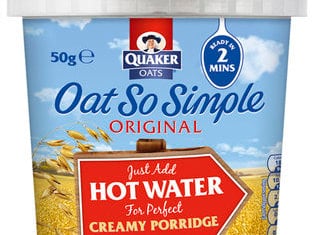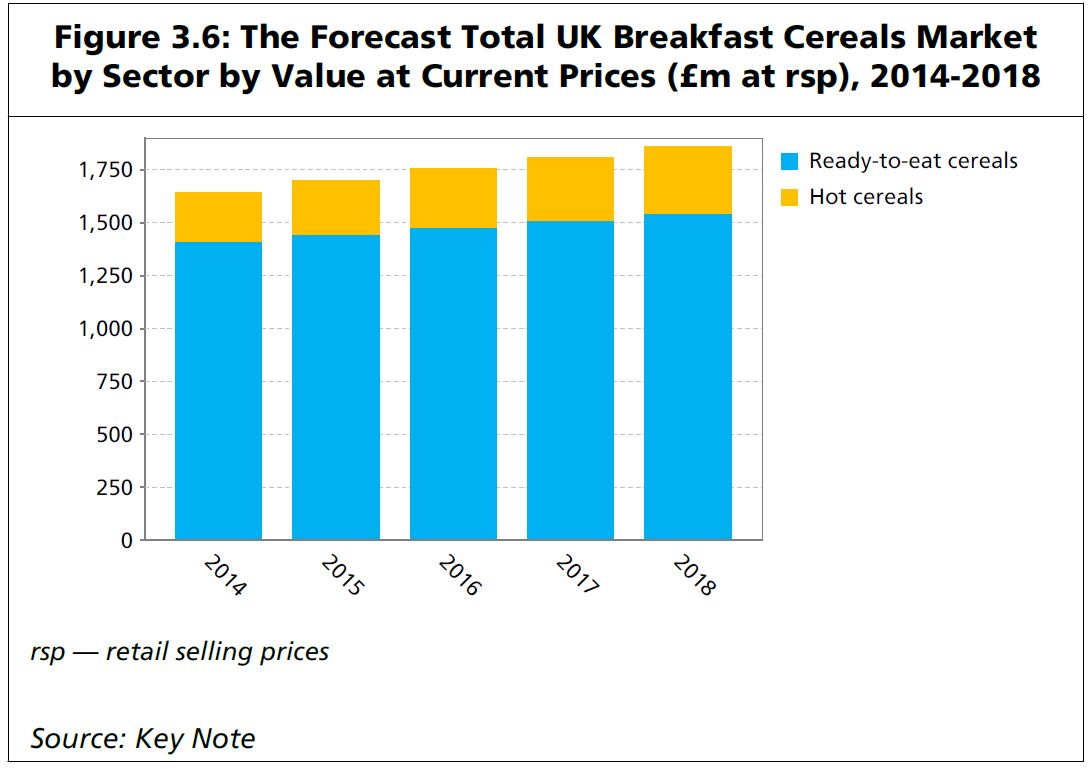In 2013, the overall UK breakfast cereals market was valued at £1.6bn ($2.58bn) and grew 4.2% – growth primarily driven by inflation amid ongoing consumption decline but underpinned by a strong demand for hot cereals, Key Note said in its Breakfast Cereals 2014 report.
Key Note said the market would grow a further 13.3% between 2014 and 2018 and tot up a value of £1.86bn ($3bn).
Hot cereals up, aligning with consumer trends
Within breakfast cereals, it said hot cereals had surged at “an extreme rate”; gobbling up more market share.
Valued at £211m ($341m) in 2013 and representing 13.2% of the UK breakfast cereal category, hot cereals were up 17.9% on the previous year in value terms. Year-on-year growth had fluctuated between 3.3% and 24% in the past five years.

Quaker and Ready Brek were the most recognizable brands in the sector, Key Note said, but there was increasing competition from brands like Jordans, Alpen, Mornflake and Rude Health.
Popularity had heightened because of innovation around flavor and convenience, it said. “The importance of flavor has allowed sales of standard boxed oats to grow, while this trend has been compounded by flavor variants such as fruit, chocolate, golden syrup or cinnamon.”
In addition, many manufacturers had developed pot variants which unlocked demand for out-of-home breakfast products, it said.
Hot cereals also appealed to health concerns around obesity and diabetes among UK consumers, it added, and played outside the concerns around consuming too much sugar – a scare that had limited the demand in RTE cereals which were perceived to be particularly sugary.

RTE cereals stagnant, sector share declining
While the RTE cereals segment had grown 2.4% in 2013 and was worth £1.39bn ($2.24bn), sector share had declined steadily over the past four years – from 91.2% in 2010 to 86.8% by 2013, the report said
“Growth in the competing hot cereals sector has substantially outpaced that of RTE formats in recent years, highlighting the decreasing dominance of the latter in the overall breakfast cereals market,” Key Note said.
Within RTE cereals, children’s cereals held the lion’s share at 26%, followed by healthy RTE cereals (24.1%) and staple cereal (22.8%).
“The children’s sector performed fairly strongly in 2013, growing in value by 2.8% from the previous year, although this is unsurprising given that concern over the negative health effects of added sugar did not come to the fore until late 2013 and early 2014,” Key Note said.

The future? Clever marketing, premium and natural
“Marketing activity will be increasingly important in this market in the coming years, as competition increased and advertising regulations, particularly with regard to targeting children, continue to be restricted,” Key Note said.
Within this, online advertising would gain prominence, it said, as manufacturers look to find new ways to target children. “While these techniques raise ethical questions, the extremely competitive nature of the market will continue to encourage leading manufacturers to adopt such strategies,” it said.
In addition, Key Note said the demand for premium cereals would rise, restricting demand for private label products. “As consumer spending power increased, Britons will prioritize quality over value, creating an opportunity for manufacturers to add new dynamism to the breakfast cereals market.”
Manufacturers should consider focusing on provenance and natural qualities of ingredients, it said, to give consumers the impression the product is value for money.
As the demand for premium grew, so too would the desire for ‘natural’ products – perhaps organic, or less processed cereals – and free-from alternatives, the report said.
